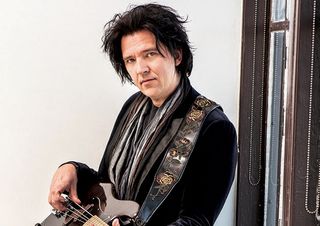
Jorgen Carlsson had never heard of Gov’t Mule in 2008 when a mutual friend recommended him to Warren Haynes to be the band’s new bassist.
“I was producing a record and playing bass for Jeff Young, who had played piano in Warren’s solo band and knew he was looking for someone,” says Carlsson, a Swedish native who had been playing sessions and gigs in Los Angeles since 1991. “He called Warren and said, ‘I have this guy who might just be crazy enough to play your stuff.’ ”
Haynes called Carlsson, beginning the conversation by saying, “If you’re willing to learn 200–300 songs by summertime we should continue talking.” When he agreed, Carlsson became one of about 10 bassists to head to New York for an audition with the Mule: Haynes, drummer Matt Abts and keyboardist Danny Louis.
Getting ready to play, Carlsson was unhappy with his rig’s sound and stepped on a Boss Hyper Metal fuzz pedal just before the band kicked into the Mule classic “Blind Man in the Dark,” a song defined by the late Allen Woody’s thundering woolly mammoth of a bass line.
“Warren looked at me, smiled and asked where I got the sound. I pointed at the pedal and he said, ‘As far as I’m concerned, you can leave that on the whole time,’ ” says Carlsson. “The audition was seven or eight songs and then we played for another two hours. They were just throwing things at me: jazz, reggae, blues, hard rock, all kinds of shit.”
A few days after returning home, Haynes called him with the job offer. Then he had to learn those hundreds of songs. Nine years later, Carlsson can laugh at the memory but he readily admits that it was a daunting task.
“Learning so much new material sounds really cool until you start trying to get it all down,” he says with a chuckle. When Carlsson started digging into the Mule repertoire of originals and covers, he realized that the task was even larger than he thought, due to the uniqueness of the bass lines played by not only Woody but also the array of players who recorded with Mule after the founding bassist’s 2000 death, a list that includes Phil Lesh, Mike Gordon, Roger Glover, Oteil Burbridge, Flea and Les Claypool.
Get The Pick Newsletter
All the latest guitar news, interviews, lessons, reviews, deals and more, direct to your inbox!
“I was mildly shocked by the greatness of the band’s bass lines at first and that increased as time went by,” says Carlsson, who resisted the temptation to dig deeply into live performances and opted instead to learn songs from studio recordings.
“Trying to live up to what Woody and the other extraordinary bass players had done would have been too crazy,” says Carlsson. “I learned the core, essential parts properly then started doing my own thing.”
He quickly began putting his own stamp on the music: in his first week the group repeated no Mule songs and played a Halloween set of Pink Floyd music.
“I felt okay, but it took a few years to get it under my belt properly,” says Carlsson. “It’s not just learning the songs, it’s learning the intricacies and personalities of the band and finding your own place, which takes a while.”
One key to Carlsson feeling more comfortable was finding a sound that really suited him, and the key to that was switching from bass to guitar amps, a move suggested by the late, beloved Mule tech Brian Farmer. This allows him to get a distorted sound without playing at an insane stage volume. He is also not shy about using effects, with a pedal board that would make most bassists either jealous or scared. It’s all part of fulfilling the unique role established by Woody.
“There’s a tremendous amount of freedom for the bassist in this band,” says Carlsson. “You can actually stomp the guitar if you have something to say. It’s a good fight.”
After nine years, three studio albums and hundreds of gigs, Carlsson has settled into Mule, which has re-established a deep chemistry and a cohesive approach that allows them to wade through a wide array of musical styles.
“The common thread is we’re a rock and roll band with a jazz improv overhang to whatever we do,” says Carlsson. “Warren brings some songs to us fairly complete and others we work up together from scratch. But they all go through the same process: we record it and if it sounds good we keep working and if it doesn’t, it’s not going to make it.”
Onstage, they follow a similar approach. “There are never any set rules,” says Carlsson. “It’s a four-wheel band onstage and anyone can steer it somewhere different at any time.”
Alan Paul is the author of three books, Texas Flood: The Inside Story of Stevie Ray Vaughan, One Way Way Out: The Inside Story of the Allman Brothers Band – which were both New York Times bestsellers – and Big in China: My Unlikely Adventures Raising a Family, Playing the Blues and Becoming a Star in Beijing, a memoir about raising a family in Beijing and forming a Chinese blues band that toured the nation. He’s been associated with Guitar World for 30 years, serving as Managing Editor from 1991-96. He plays in two bands: Big in China and Friends of the Brothers, with Guitar World’s Andy Aledort.

“You can set up amplifiers and drums to your heart’s content”: Gene Simmons defends paid roadie scheme

“I woke up to a DM from Shirley Manson asking if I'd be interested in the gig. We had never met”: Former Smashing Pumpkins bassist Nicole Fiorentino on how she landed her role in Garbage – with no audition










